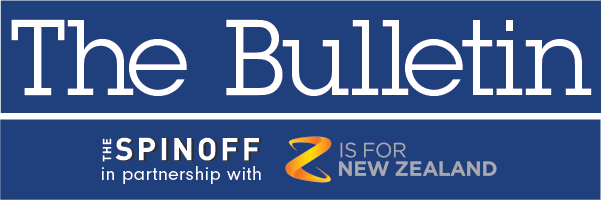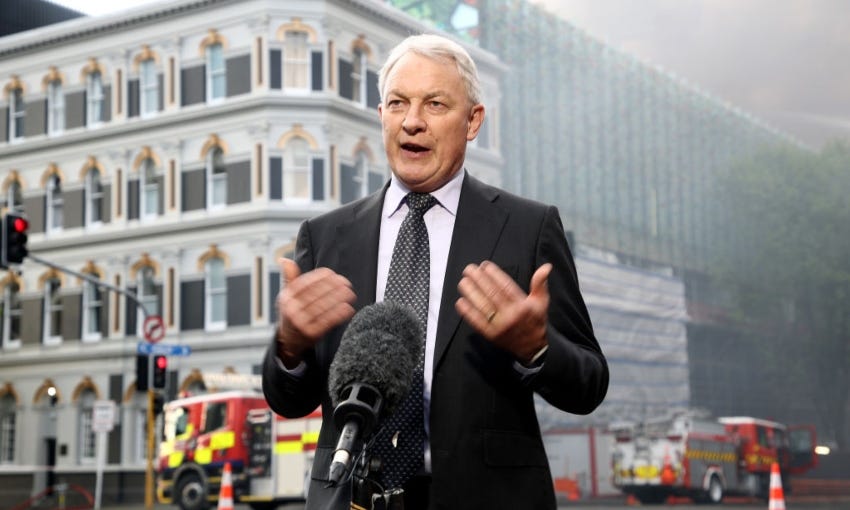Auckland Council considers one-off rates hit amid Covid damage
The council books were particularly vulnerable to Covid, and have suffered badly as a result
Good morning and welcome to The Bulletin for Wednesday 2 December, by Alex Braae for The Spinoff. Presented in partnership with Z Energy.
Just quickly – I woke up at a normal time over the last two days, and the first thing I did was have a read of Stewart Sowman-Lund’s excellent debut Bulletins. My thanks to him for filling in.
In today’s edition: Council considers rates hit to cover Covid, revenue minister fires warning shot over trusts, and some common sense on drug law reform.
Image: Phil Goff standing in front of the 2020 Council revenue projections (Getty Images)
Auckland Council is set to lose a billion dollars in revenue, and they're planning on asking ratepayers to pay a bit more to cover it. Radio NZ reports the proposed 10 year budget was released yesterday, including a one-off 5% rates hit. Mayor Phil Goff said it will amount to an average of $36 per affected household, and will allow the council to continue with a multi-billion dollar capital infrastructure programme.
Some options that were initially considered haven't in the end been included. Stuff's Todd Niall has a story which includes some of them – one of the now-shelved revenue raisers would have been a targeted rate to fund climate change related action. However, as environment chair Richard Hills put it, the preferred option is to have climate action be part of the 'business as usual' funding and spending of the council. An additional $150 million over 10 years has been proposed here, and it will include measures like phasing out diesel buses.
With Covid-19 blowing a massive hole in Auckland Council's budget, none of the potential solutions would have been painless. Austerity was one potential approach – I wrote about that back in June, particularly the contrast between central government's big spending and local government's comparative squeeze. And borrowing wasn't necessarily an option, particularly in a time of lower revenue – this piece from Stuff's Todd Niall from several weeks ago goes into the council's self-imposed borrowing limits and why they exist. Auckland Council was particularly vulnerable to Covid, because less than half of their funding comes from rates – events and dividends from the ownership share in the airport are among the other sources.
Not everyone is okay with the rates bump. The Auckland Ratepayers Alliance put out a release challenging the numbers put forward by Goff, while also describing the rise as "aggressive". They also called for a bit more of a "slash and burn" approach to council spending. The NZ Herald's Bernard Orsman reports that across both rates and water bills, the average household will be facing additional costs of more like $230.
Meanwhile, Auckland will also be looking at the possibility of congestion charges coming in for driving through the CBD. As Todd Niall (who else) writes, it's something of a no-brainer as an idea, to incentivise people away from clogging up the roads and switching to more climate friendly transport instead. However, it will also require councillors showing some firm leadership to make it actually happen. As an aside, it's never easy for politicians to tell the people who elected them that it will cost money to live in a better city.
New revenue minister David Parker has fired a warning shot over the use of trusts to dodge the new top income tax rate, reports Stuff's Thomas Coughlan. This week legislation will go through putting the top income rate up to 39%, but trusts will stay at 33%, meaning any competent accountant will be able to help their clients get around it by restructuring their income. Anticipating this, Parker said the government will be monitoring the situation, and if there's widespread rorting the trust rate will go up too.
A bit of common sense on drug law reform, at long last: The government will pass urgent legislation allowing for drug testing to take place over the summer. According to justice minister Andrew Little, the aim is to give legal certainty to testing organisations like Know Your Stuff, so that they can ensure that people know whether or not their drugs are safe. Justin Giovannetti reports that the current interim law is aimed at festivals, but it could be expanded beyond that in the future.
This won't make the recreational drugs legal of course, and people will still be advised to not take them. But that advice has been going out for decades and made little difference, while at the same time deaths have continued from people taking spiked substances. Courtenay Chenery has written about just such an experience from her early 20s, and how had testing been available she wouldn't have taken the dodgy substance.
Struggling to work out how to spread the Christmas cheer this holiday season? Have you checked out The Spinoff’s merch store? It’s the perfect Christmas destination.
Oranga Tamariki minister Kelvin Davis has ordered a formal review of a case that has caused yet more controversy for the agency, reports Newsroom. The case was the subject of a Newsroom video documentary, which has since been taken down via a court order, pending a full hearing. Davis said he had watched most of that documentary, and the explanation given to him by officials had not satisfied his concerns.
A new report into child poverty has detailed how the problems that have been known about for years are likely to get worse without dramatic action, reports Radio NZ's Sarah Robson. The key intervention that could be made is the redistribution of more wealth to both the families that have ended up in poverty this year, and those who have been living in it long term. Among the most important effects from living with a lack of money: poor quality housing, food insecurity, and a greater prospect of preventable hospitalisations and deaths.
A whole lot of new privacy laws came into effect yesterday, and Radio NZ has a handy rundown of them all. The new rules will require organisations to handle private information more carefully, and also give powers to the privacy commissioner to ensure the law is being enforced. People will also have more ability to force organisations to reveal what aspects of their private information is being held.
Best Journalism of 2020: Now I'm not going to pull a Jacinda Ardern here and blame the public for my own problem, but some of the suggestions for this so far haven't quite been suitable. Mostly the problem is that those coming in are extremely recent. While I'm keen to capture the full span of the year, I accept it's a difficult one to cast your mind back on. There was also the odd nomination for this publication – very kind, but very much not the point. So a few more of these this year are going to be written by me, with suggestions from readers thrown in too.
First up, I'm going to highlight a journalist doing excellent work on the local government grind. The NZ Herald's Georgina Campbell has picked up where she left off from the elections last year, and become an expert on earthquake strengthening and infrastructure, two long-ignored Wellington issues that have since become unavoidable. Here's an example – a clear explainer from May about why exactly the central library has been closed for so long. This sort of work is deeply underrated, and very difficult to do well, but it's vital that it keeps getting written.
Anyway, journalists and editors are welcome to get in on this too as well as readers – send me your best scoops at thebulletin@thespinoff.co.nz.
Got some feedback about The Bulletin, or anything in the news?
Drop us a line at thebulletin@thespinoff.co.nz
Right now on The Spinoff: Justin Giovannetti has written a really good piece about the day ahead coming up for PM Ardern, and what it signals about the next term. Shane Cronin writes about the difficult balance of welcoming people facing charges for the deaths during the Whakaari eruption, but how it can't become a blame-game. An essay written in partnership with Te Punaha Matatini looks at the future of the food system post-Covid. There's a brand new episode of books podcast Papercuts. Michael Andrew writes about how Spark is trying to do something different with its Commercial Bay store. And a new Frame documentary looks at a group of people doing everything they can to stop kauri dieback.
For a feature today, a really interesting look at the maturing of the Bitcoin market for investors. It's a New York Times piece republished on the (paywalled) NZ Herald, and it explores why cryptocurrencies are less volatile and more institutionalised now, why prices are rising again, and what that suggests about the trust in markets more generally. Here's an excerpt:
In May, Paul Tudor Jones, one of Wall Street's best-known hedge fund managers, said he had put almost 2 per cent of his portfolio in Bitcoin. He said the cap on Bitcoin production made it an attractive alternative to the declining value of traditional currencies, which he thought was inevitable as central banks printed more money to encourage an economic recovery.
"Every day that goes by that Bitcoin survives, the trust in it will go up," Jones told CNBC at the time. He did not respond to a request for comment for this article.
Some public companies also dived into Bitcoin because of concerns about the value of the dollar. In August, MicroStrategy, a software company in Virginia, said it bought US$250 million of Bitcoin to store some of the cash it had in the corporate treasury.
Big changes are coming for domestic football, with a move to a conference based system, and an expansion of the women's tournament. Stuff's Andrew Voerman reports the priority for NZ Football making the changes is youth development and sustainability of competitions – there seems to be some recognition there that the best ambassadors for the game are the likes of Chris Wood, Meikayla Moore and Sarpreet Singh, who start in NZ before joining the big leagues overseas. There will also be a crackdown to maintain the amateur status of clubs and competitions.
That's it for The Bulletin. If you want to support the work we do at The Spinoff, please check out our membership programme








